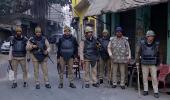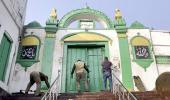The Archaeological Survey of India has submitted its response in a court -- which had allowed a survey of the Shahi Jama Masjid in Sambhal -- seeking control and management of the Mughal-era mosque as it is a protected heritage structure.

Representing the ASI, lawyer Vishnu Sharma said the agency submitted its counterargument in the court on Friday, stating that it faced resistance from the mosque's management committee and locals in conducting surveys of the site.
He said the ASI also highlighted an incident from January 19, 2018, when an FIR was filed against the mosque's management committee for installing steel railings on the mosque's steps without proper authorisation.
The mosque, notified as an ASI-protected monument in 1920, is under the purview of the agency and as such, public access to the structure should be permitted, provided it adheres to ASI regulations, Sharma said.
The ASI argued that control and management of the monument, including any structural modifications, must remain with it.
It also raised concerns that unauthorised changes to the mosque's structure by the management committee are unlawful and should be restricted.
The court is expected to deliberate on the matter in the coming days.
Violence erupted in Sambhal on November 24 during a court-ordered survey of the Shahi Jama Masjid there, killing four people and injuring many others.
A three-member judicial commission has been formed to probe the violence and it is likely to visit Sambhal on Sunday.
Moradabad Divisional Commissioner Aunjaneya Kumar Singh said, "Two members of the commission formed by the Uttar Pradesh government reached here on Saturday. The third member will join them on Sunday as they head to Sambhal."
The survey was linked to a petition claiming that a Harihar temple once stood at the site of the mosque.
The commission formed via a notification on November 28 has been directed to complete its probe within two months. Any extension of this timeline will require government approval.
The commission headed by retired Allahabad High Court judge Devendra Kumar Arora comprises ex-IAS officer Amit Mohan Prasad and Arvind Kumar Jain, a retired IPS officer.
It has been entrusted with the task of examining whether the clashes were spontaneous or part of a well-planned criminal conspiracy, as well as the preparedness of the police and the administration in handling the situation.
The commission will also analyse the circumstances leading to the violence and recommend measures to prevent similar incidents from occurring in the future.










